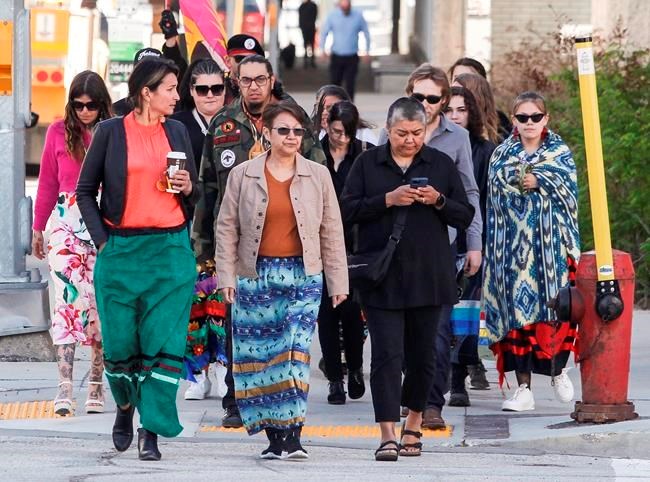WINNIPEG — A self-described white supremacist who killed four Indigenous women told police the slayings were drug-fuelled and that he viewed their deaths as "mercy killings," court heard during the opening day of his murder trial.Â
"I believe that this was something that God called me to do ... it was something that I decided to do because I thought it was right," Jeremy Skibicki tells Winnipeg police in an interrogation video played at the trial Wednesday.
Skibicki, 37, has pleaded not guilty to four counts of first-degree murder for the slayings in 2022. His lawyers have told court that he admits to the killings but is not criminally responsible due to mental illness.
Crown prosecutors are opposing the defence.
They allege Skibicki targeted Indigenous women at Winnipeg homeless shelters and assaulted the four victims before killing them and disposing of their bodies.
“This case is about a man’s hate-filled and cruel acts perpetrated against four vulnerable Indigenous women," prosecutor Renee Lagimodiere told court.
She said Skibicki staked out homeless shelters to find his victims, then devised a calculated scheme about what he would do with them.
"He preyed on these women in Winnipeg shelters and invited them back to his home, where he assaulted them, often sexually, and killed them,” Lagimodiere said.
"He engaged in vile, sexual acts with their bodies. He then disposed of the women as though they were garbage."
Three of the victims have been identified: Rebecca Contois of O-Chi-Chak-Ko-Sipi First Nation, and Morgan Harris and Marcedes Myran of Long Plain First Nation. The fourth has not been identified but Indigenous leaders have given her the name Mashkode Bizhiki'ikwe, or Buffalo Woman.
The remains of Contois were found in a dumpster and at a landfill. The remains of Harris and Myran are believed to be in a different landfill. Police have said it's not known where the remains of Buffalo Woman are located.
Family members of the three identified women filled the courtroom as bundles of tobacco wrapped in red cloth were passed out to people in the gallery to hold onto as a form of good medicine.Â
They heard that Skibicki was picked up by police shortly after some remains of Contois were found in May 2022.
He was held in custody for almost 24 hours and interrogated for seven of those hours. An edited version of the interview was played in court.
While being questioned about Contois's gruesome death, he blurted out that he had killed others.
“I killed four people,” Skibicki says in the video, unprompted.Â
He told police he was coming off of psilocybin, or magic mushrooms, when he killed Buffalo Woman. Before killing the other three, he took methamphetamine.
GRAPHIC WARNING: The following details may disturb some readers.
The Crown detailed the killings in court.
Lagimodiere said Skibicki forcibly confined Buffalo Woman, believed to be an Indigenous woman in her mid-20s, choked her and drowned her.Â
Skibicki put Harris, 39, in a headlock, and she collapsed with her head in a tub full of water, said Lagimodiere. He disposed of her body in a garbage bin.Â
Lagimodiere said Skibicki was having sex with Myran and got rough with her. He then put the 26-year-old in a headlock and choked her. He later dismembered her, said the prosecutor.Â
Skibicki assaulted Contois when the 24-year-old told him to get off of her during sex. He then choked her, smothered her with a pillow and dismembered her in a bathtub, said Lagimodiere.
Police were alerted to the killing of Contois by a 911 call, which was played in court, from a man who found a head in a dumpster behind an apartment building.
Family members of Contois later left the courtroom when the Crown began playing the police interrogation video.
Skibicki told officers he believed the killing was racially motivated, saying he felt that he was never able to connect with someone who was Indigenous. He also said during his interrogation that he was a Holocaust denier and believed there was a systemic genocide of white people.Â
He said he got "sloppy" when it came to disposing of Contois's remains.Â
"Do you think you would have stopped (killing women)?" one officer asked Skibicki. He replied no.
Court also heard Skibicki was abusive toward animals as a youth and that the cruelty continued into his young adult years.Â
Skibicki told officers he suffered from borderline personality disorder and post-traumatic stress disorder.
He said he believes his issues stem from being molested as a child. He said he became attracted to women who were unconscious, intoxicated or dead.Â
He asked to see an Eastern Orthodox priest, telling police, "Knowing that I may be incarcerated, I know that I may never have that opportunity again ... I should confess my sins to God."
A finding of not criminally responsible means an accused was incapable of appreciating the nature and quality of an act due to a mental disorder. The person is detained in a hospital until a review board determines they are no longer a threat to the public.
The federal government has a support line for those affected by the issue of missing and murdered Indigenous women and girls: 1-844-413-6649. The Hope for Wellness Helpline, with support in Cree, Ojibway and Inuktitut, is also available to all Indigenous people in Canada: 1-855-242-3310.
This report by The 91Ô´´ Press was first published May 8, 2024.
Brittany Hobson, The 91Ô´´ Press
Note to readers: This is a corrected story. A previous version used the wrong pronoun for prosecutor Renee Lagimodiere.



